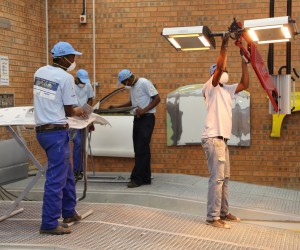Skills shortages are widely regarded as key factors which slows economic growth globally. As a result, the Automotive Industry Development Centre (AIDC) established its Skills Development and Training (SD&T) Department to identify skills deficiencies within the automotive sector, develop programmes to nurture individuals and drive economic growth in South Africa.
AIDC Acting CEO, Dr David Masondo, says the main focus of AIDC’s SD&T Department is to become a catalyst for Government to explore solutions to address skills shortages in the automotive industry and its allied sectors. “The AIDC SD&T Department is thus targeting scarce and critical skills in accordance with long-term requirements emanating from the automotive sector’s needs as confirmed by merSETA.”
The SD&T Department’s objectives are to:
- address scarce and critical skills in the automotive sector and allied sectors;
- support talent pipeline strategies as a feeder into the automotive sector by building a talent pipeline programme within the sector;
- enhance trade and artisan development initiatives key to the success of the automotive industry through a collaborative process thus improving global competitiveness and improving local manufacturing;
- provide mentoring and coaching, project management training, and developing learning material in accordance to quality standards;
- secure funding to support its training objectives; and
- attract students who display exceptional matric grades and with a tenacity to pursue technical careers such as engineering.
“The SD&T Department has partnered with merSETA to ensure quality training and development of scarce skills through recognised training centres. The department has cemented relationships with established higher education institutions including, but not limited to UNISA, Tshwane University of Technology and Orbit College. The SD&T Department also currently manages a ‘Turnkey Bursary Programme’ to develop artisans on behalf of Siemens,” says Dr Masondo.
The SD&T Department strives to ensure that training and development programmes are effected through its key training sites, the Gauteng Automotive Learning Centre, assembly simulator facilities, BBBEE Automotive Incubation Centres and the Winterveld Enterprise Hub: Automotive.
The Gauteng Automotive Learning Centre
The learning centre will accommodate approximately 1000 learners annually, on a variety of training programmes, aimed at addressing both the current skills shortage and broadening their technical skills base.
The training programmes on offer includes: mechatronics, autotronics, PLC and CNC, various general classroom and PC training, welding, spray painting, vehicle aftermarket service and maintenance, and a variety of school support programmes.
The AIDC will soon introduce a learner management system (LMS) with access to all stakeholders and students. The facility will also launch a start-of-the-art vehicle assembly simulator, made up of a vehicle assembly area which is designed primarily to replicate the specifications of the actual vehicle assembly process for the new Nissan pick-up vehicle, which goes into production in 2017.
Assembly Simulator Facilities
The SD&T Department procured training equipment, including a robot training cell and a Production Simulation Facility (PSF). During the start-up phases of the T6 Ranger production, FMCSA used the PSF to train all its employees who would be involved in the T6 Ranger production. At present, the PSF is used to train engineering students from Gauteng-based tertiary institutions, thus providing them with practical skills training and expose them to the mechanics of car assembly. A second assembly simulator is currently under construction at the GALC.
BBBEE Automotive Incubation Centres
The AIDC established a BBBEE Automotive Incubation Centre, housing five black-owned enterprises who could supply components directly to the production line. In essence, it assisted the OEM to lower its production costs and be awarded a contract to produce the T6 Ranger for local and export markets.
BBBEE entrepreneurs hone their skills whilst supplying components directly to the OEMs production line. They are mentored during this period and graduate from the facility in 5-7 years.
Winterveld Enterprise Hub: Automotive
Informal auto body repairers receive mentoring and training from master artisans located at the facility. It aims to develop township enterprises.






